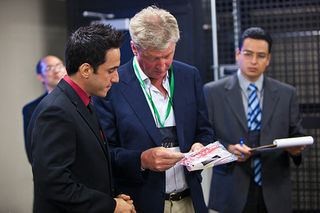UK web guru handed key to the internet?
A UK business man has been given a key that can reboot parts of the web, but not the entire internet as some reports have suggested.

A UK tech guru has been handed what is being referred to as a "key" to restart the internet, but it appears in reality he has been given responsibility for safeguarding just a part of the web.
What Paul Kane, chief executive (CEO) of Bath-based firm CommunityDNS, has actually been given is essentially a smart card that can be brought together with other such cards to create a recovery key for websites using a new form of web security known as Domain Name System Security (DNSSEC).
Kane admitted to the Guardian when the recovery key is initiated, only those sites using DNSSEC will be rebooted, not the entirety of the internet.
DNSSEC is designed to provide authentication of domain name system data and will most likely only be used by a "small number" of "important" operators where users need to verify they are using a legitimate website, according to CommunityDNS, which helped develop the technology.
The security system was launched earlier this month and is aimed at protecting people from the likes of phishing attacks and malicious websites.
If a cataclysmic security breach happens, then a minimum of five trusted community representatives could potentially gather in the US to activate the master key and reset systems.
Out of 60 candidates up for selection by ICAAN, seven were chosen and were recently handed their special smart cards in a tamper-evidence bag.
Get the ITPro. daily newsletter
Receive our latest news, industry updates, featured resources and more. Sign up today to receive our FREE report on AI cyber crime & security - newly updated for 2024.
Despite not actually being one of the true protectors of the entire internet, Kane was nevertheless flattered to have been chosen as the representative for Western Europe.
"I'm honoured and excited to be recognised for past achievements and current contributions to global internet security as we add additional tools to allow the end user to feel more confident in their use of the internet," Kane said.
Vincent Cerf, known as the father of the web, heralded the coming of an important new security offering in the form of DNSSEC.
"More has happened here today than meets the eye," he added. "An infrastructure has been created for a hierarchical security system, which can be purposed and repurposed in a number of different ways."
Tom Brewster is currently an associate editor at Forbes and an award-winning journalist who covers cyber security, surveillance, and privacy. Starting his career at ITPro as a staff writer and working up to a senior staff writer role, Tom has been covering the tech industry for more than ten years and is considered one of the leading journalists in his specialism.
He is a proud alum of the University of Sheffield where he secured an undergraduate degree in English Literature before undertaking a certification from General Assembly in web development.





